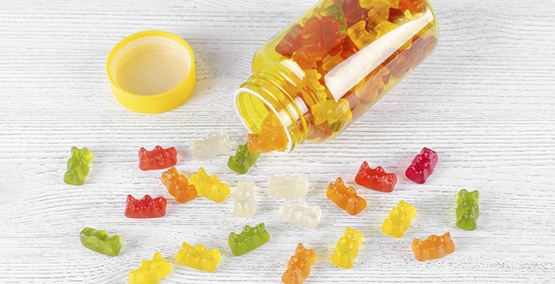
Tricks to help kids gain weight
17 tips to help your children eat more
-It's often hard to get children, especially toddlers, to eat more. If they gag, you know they may vomit with the next bite or even before they get it into their mouths. Or they turn away. Or flat out, scream as if someone would think you're forcing poison on them.
But some kids don't gain weight well . And they may be classified as failing to thrive ( an old term) or malnourished. They need more calories. And because they may not be getting much of anything good, so they may lack protein and some of their essential vitamins and minerals too.
It's tempting to just give them what they'll take. Crackers, milk. But of course, that can just make the situation worse, because that sets up a pattern. If I scream and cry or gag, I won't have to eat my vegetables and they'll give me what I want. I may be able to make it into a game so they'll chase me around and follow me with a bag of crackers or a cup of milk. And I've seen that strategy work for some kids until the parents are worn out and frazzled, and finally go to an expert who can help.
So it's time to change strategies.

Breaking Old Habits
- Talk to someone: your doctor, a nurse in the office, a trusted friend, your parents (grandparents can be part of the problem, if they keep the kids part-time and indulge them or even have a very different pattern than you've established). You may not realize all the feeding and mealtime habits you've gotten into.
- Recognize that you don't eat the same amount every day—your kids won't either. They may only eat 2 meals each day.
- Toddlers and some older kids have small stomachs, so offer lots of little meals rather than a big meal or two.
- You may have certain foods you don't like or won't eat. If you make a face or let your child know that, he or she will quickly pick up on that. They may also refuse that food, and they may use that as the reason for not trying other foods too. Remember it can take about 15 tastes of a food to like it.
- No snacks for 2 hours before mealtime. Small, frequent meals and snacks can help-but not if they're an hour before the kids next meal.
- Hold fluids until after the meal. You may be happy seeing your child quench their thirst with water or milk. But they fill kids up so they don't have room for much else. So no clear fluids like water for 1/2 hour before or at the beginning of a meal, even at a restaurant, where the first thing they bring out is something to drink. And milk or other drinks should be held for an hour.
- Put a toddler's portions on your plate. Kids are much more interested in what you're eating than what you've served them. And when you give them what's on your plate, only give 3 bites at a time. If you give more, they can become a toy or a snack for your pet. When they've eaten those 3, offer another round.
- Encourage older kids to help you prepare or serve the meal. That might interest them in what they're going to have. You might even take a bite or 2 at the stove, and offer them some as well.
- Ask them what they'd like (giving them healthy choices). Ask them whether they want A or B, not yes or no. For example: Would you like carrots or green beans with your dinner tonight.
- Eat as a family if you can, or at least have someone eat with them. Encourage a discussion, so that the meal also becomes a pleasant family or social event, so the focus isn't on getting them to eat.
- Serve bigger portion sizes. Kids often eat more when the plates and portions are larger.
- Kids with sensory issues should be given small amounts, because they tend to become overwhelmed seeing larger amounts
- Try finger foods for preschoolers. They sometimes like that more than using a spoon or fork.
- Eliminate other distractions, like television or other kids running around the house.
- Serve healthy foods for meals and snacks
- Use filling snacks and drinks in the evening. Sometimes they are so filling (like my supper shake, in the snack article), that they'll get in the way of the next meal—even hours later.
- If these strategies aren't working, talk to a dietitian or your doctor about using food supplements like a toddler formula and / or an appetite stimulant (cyproheptadine).




